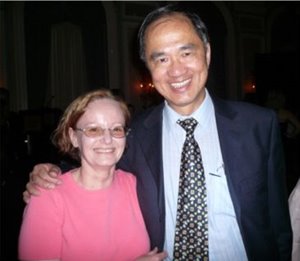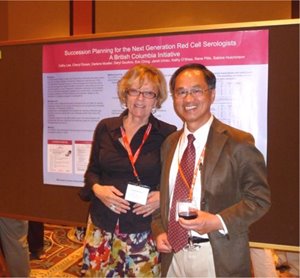Pat Letendre interviews our TM colleagues - past & present:
It's my pleasure, indeed an honour, to write a series of blogs for CSTM to celebrate the careers of transfusion professionals who came before and made a difference. Some names you may recognize, some you may not. But rest assured these diverse individuals all made a difference and we are the better for it.
Each blog begins with my musings on the individual, followed by a brief background on the person's career, sometimes with my comments throughout. If you're looking for a rah-rah, rosy view of Canada's transfusion medicine field, this ain't it. Why? Although all participants enjoyed their careers and love the transfusion profession, they also speak honestly about both the ups and downs. Perhaps their reflections will resonate with your experiences.
I will remember you: Eric Ching
This blog features Eric Ching, a medical laboratory technologist/scientist I first met in Edmonton years ago when Dominion Biologicals in NS was Immucor's Canadian affiliate. Later, Eric was an Immucor sales representative who I would occasionally see on his trips promoting solid phase technology for pretransfusion antibody screening.
Since then I've had the pleasure to chat with Eric at several transfusion medicine conferences. If you follow my TM blogs, you'll know I often criticize industry. But Eric is what my dear departed Dad, from his days in England as an RCAF pilot in WWII, would call a 'scholar and a gentleman,' meaning the dude is well educated in his field, courteous, admirable and held in high esteem.
For interest, Eric has both Canadian and American specialist certification: ART certification in Immunohematology from CSMLS and Specialist in Blood Bank (SBB) certification from ASCP. During his long career as a medical technologist, he published many papers in international journals.
BACKGROUND
The key to understanding Eric is to realize that he has presented many continuing education (CE) courses over the years for provincial and national professional associations. He loves to teach, to mentor others in immunohematology, a discipline he clearly cares about. Those who develop and conduct CE courses know that the amount of preparation time and overall time spent increases exponentially to what you initially think it will be. You've got to love your discipline and be passionate about education. Eric offered CE courses over and above his day job in his 'spare time'.
As a testament to how colleagues think of Eric, he was awarded the Dr. Donald I. Buchanon Memorial Lecture Award at the 2007 CSTM Congress in Calgary. The Award is chosen by the local CSTM conference organizing committee from their catchment area. It's named for an beloved transfusion medicine physician who was a strong supporter of technologists.
Before you can truly appreciate how Eric made a difference and understand his musings, you should know more about his experiences as a medical laboratory technologist and industry representative.
For a few of Eric's many contributions to Canada's transfusion community, see a short resume.
ERIC'S MUSINGS
Accomplishments?
It has been my life time goal to challenge colleagues to remain as a technologist and not become a technician. It also gives me great satisfaction to see students who became competent blood bankers by applying their knowledge to solve problems.
Most fun?
Music in my ears:
- Students: “I get it now!”
- Colleagues: “I passed my ART, thanks!”
- Marilyn Moulds: “You are dealing with the first patient who has an anti-Lu12.”
Memorable moments
- Circa 1976, Calgary Red Cross: “Eric, you can’t send blood without a box!”
- 1995, Foothills Medical Centre: “Eric, trauma unit just asked for 500 units of red cells for a patient.”
- Tuesday, July, 1987- I was working evenings part-time at Calgary Red Cross, Tues. July 28, 1987:
- Day tech greeted me with a smirk on her face, “We have a gift for you.“
- I saw four red tops with just clots, no more serum! A stack of panel sheets showing panagglutination at 2-3+, autologous control was negative.
- The sample was from a nearby rural hospital from an aboriginal teenage mom with post-partum hemorrhage, no prenatal work up.
- After ringing the clots, I managed to get 6 drops of serum and pondered what to do next.
- Phone rang and it was her obstetrician: “My patient’s hemoglobin is around 60, when can you send us blood?”
- When I told him that we have a problem finding compatible donors, he calmly replied, ”We managed to stop the bleed, but if she starts to bleed again, I can give her universal donor blood”!
- Phenotyping her red cells with antisera to high incidence antigens revealed that the patient was Vel negative.
- Out of the four Vel-negative panel red cells collected from local hospitals and frozen rare reagent donor cells, three were 1-2+!
- To make a long story short, we received two more clotted specimens the next morning and sent them to CBS's National Reference Laboratory in Ottawa.
- The patient didn’t need blood and she walked out the next day with her baby! The antibody additional to ant-Vel was anti-P1.
- Friday July 31, 1987:
- Many Edmontonians still remember this as their Black Friday. A tornado touched down in a trailer park that afternoon resulting in multiple casualties and deaths.
- I was tasked to communicate with the then airline Pacific Western Airlines (PWA) to hold the airbus heading to Edmonton for our drivers to bring boxes of donor blood over. Then, Kerry and I issued and packed over 200 units....
- I earned my paycheque that week!
[Photos from CSTM 2007 Congress ]


 Significant regrets?
Deletion of discipline specific ART
Significant regrets?
Deletion of discipline specific ART
I see a gradual depletion of expertise in our profession in the last 10-15 years. In the good old days, most employers required technologists holding senior positions to have the ART designation. CSMLS
discontinued the ART in 2011. Since then, there has been little incentive for technologists to pursue higher level in education.
There are many benefits to ART candidates:
- The ART literature review enabled technologists without a university background to search information from text books and journals and
- To analyze data generated from research
- To gain more in depth knowledge of the field of interest.
I would like to see Canadian professional societies, in our case CSTM, CMLTA and CSMLS, as well as employers, devise a better career path and provide monetary incentives for technologists to excel in our specialty. This can be achieved by re-establishing a post-graduate program similar to SBB in the US or fellowships in other countries.
Biggest challenge for the profession?
As Pat alluded to in this blog, experienced technologists are retiring in the next 5-10 years leading to a 'brain drain'. Therefore, CSTM needs to take a leadership role to engender interest among younger colleagues.
In 2013, I attended the Australian NICE (National Immunohematolgy Continuing Education) weekend, an annual event where participants must give a 5 minutes presentation on any TM subject with a few minutes for questions. The event was well organized and well attended as they have great social programs as well. NZ also has a NICE weekend too.
I think CBS could also host provincial or city journal/case study/antibody clubs if it collaborated with local hospital management to provide space and allow technologists to attend during 'office hours' or if compensated time-off events were held on weekends.
Looking forward, I feel strongly that blood group serology is a dying art and few technologists have taken up the torch to gain more knowledge in this area. Although genotyping has significantly improved antibody identification, it takes several hours to a few days to get results.
PAT'S FINAL MUSINGS
Eric made a difference in these roles and in so many other ways. Currently, he blogs for CSTM just for the fun of it. One of his latest blogs is a quiz on how well you know blood group antigen history. Scroll down for his other immunohematology-related blogs. Eric's another one of the 'oners' that Canada's transfusion medicine community has been blessed with.
Comments are most welcome. Do any of Eric's experiences resonate with yours? Please add to the record of what it was (or is) like to work as a transfusion professional in Canada.